MA612 Ethics: Ethical Dilemmas, Cultural Nuances & Professional Code
VerifiedAdded on 2023/06/04
|8
|2382
|389
Essay
AI Summary
This essay identifies and analyzes key elements of ethical issues and demonstrates the application of the Code of Ethics for Professional Accountants to address ethical challenges in accounting and business. It also recognizes the influence of cultural issues in resolving ethically challenging topics and presents solutions to identified ethical issues. The essay emphasizes the importance of trust, honesty, confidentiality, technical integrity, and open environments in maintaining ethical business practices. It highlights the accountant's role in upholding integrity, objectivity, and professional standards, while also considering the impact of culture on ethical perceptions and decision-making. The essay concludes by advocating for ethics policies, training, and consistent supervision to minimize conflicts of interest and promote ethical conduct within organizations.
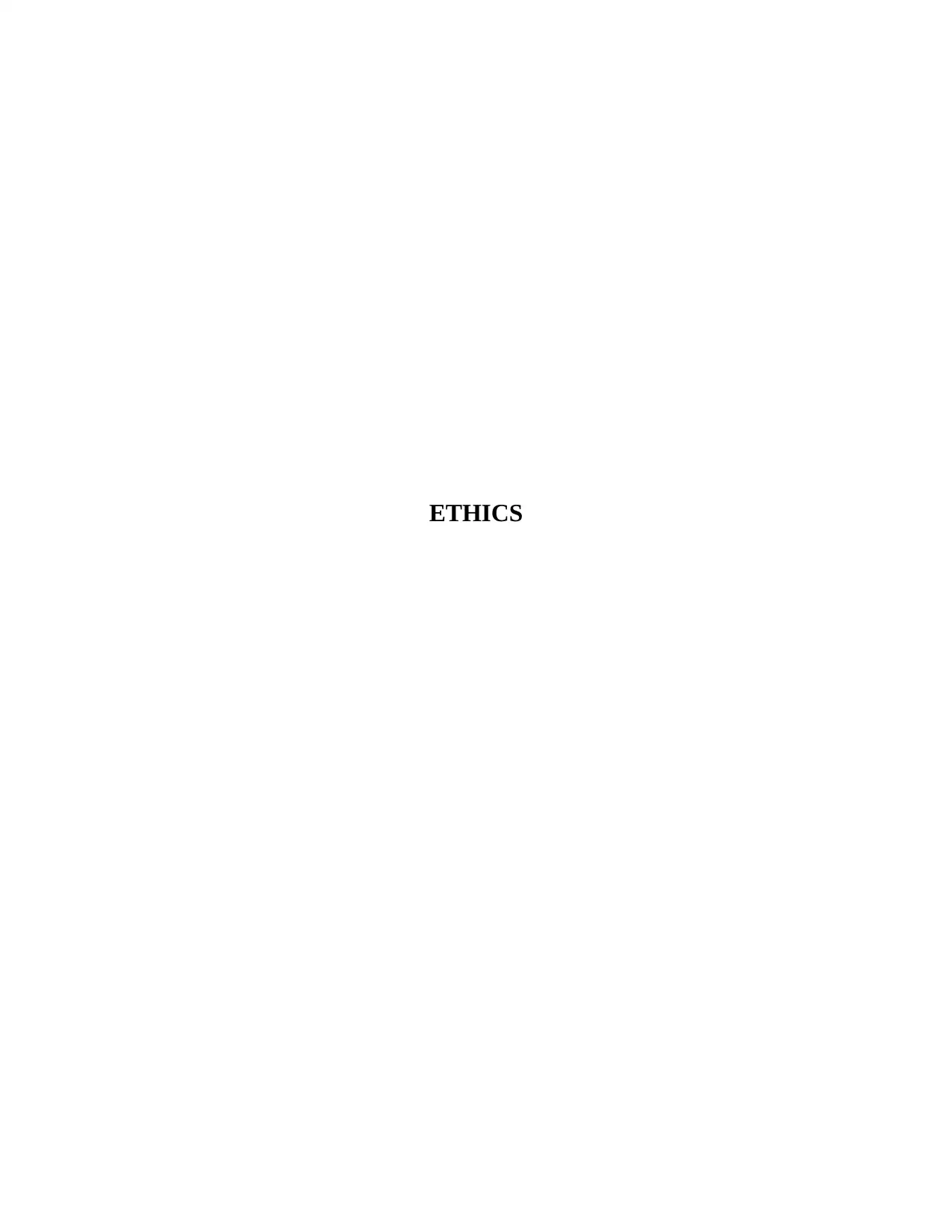
ETHICS
Paraphrase This Document
Need a fresh take? Get an instant paraphrase of this document with our AI Paraphraser
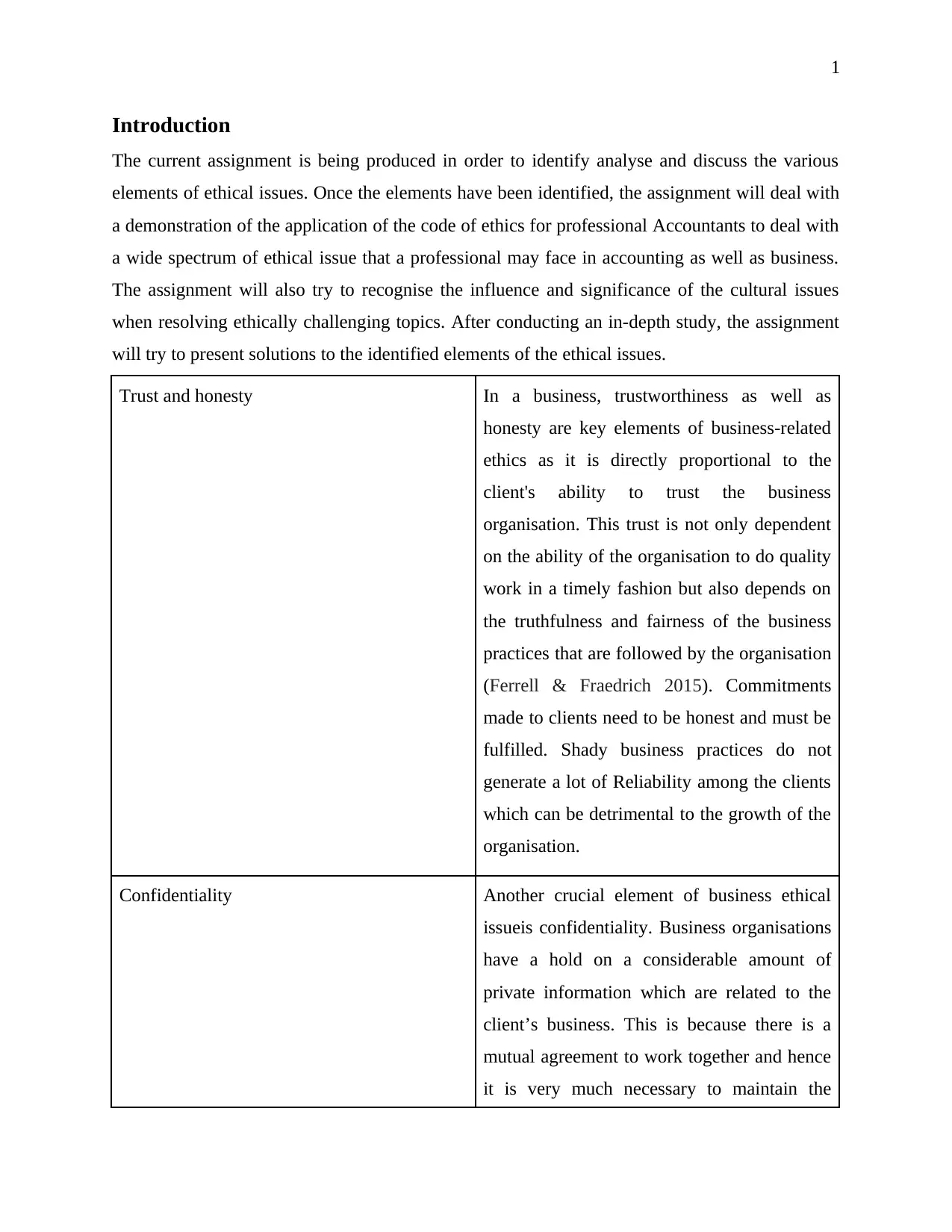
1
Introduction
The current assignment is being produced in order to identify analyse and discuss the various
elements of ethical issues. Once the elements have been identified, the assignment will deal with
a demonstration of the application of the code of ethics for professional Accountants to deal with
a wide spectrum of ethical issue that a professional may face in accounting as well as business.
The assignment will also try to recognise the influence and significance of the cultural issues
when resolving ethically challenging topics. After conducting an in-depth study, the assignment
will try to present solutions to the identified elements of the ethical issues.
Trust and honesty In a business, trustworthiness as well as
honesty are key elements of business-related
ethics as it is directly proportional to the
client's ability to trust the business
organisation. This trust is not only dependent
on the ability of the organisation to do quality
work in a timely fashion but also depends on
the truthfulness and fairness of the business
practices that are followed by the organisation
(Ferrell & Fraedrich 2015). Commitments
made to clients need to be honest and must be
fulfilled. Shady business practices do not
generate a lot of Reliability among the clients
which can be detrimental to the growth of the
organisation.
Confidentiality Another crucial element of business ethical
issueis confidentiality. Business organisations
have a hold on a considerable amount of
private information which are related to the
client’s business. This is because there is a
mutual agreement to work together and hence
it is very much necessary to maintain the
Introduction
The current assignment is being produced in order to identify analyse and discuss the various
elements of ethical issues. Once the elements have been identified, the assignment will deal with
a demonstration of the application of the code of ethics for professional Accountants to deal with
a wide spectrum of ethical issue that a professional may face in accounting as well as business.
The assignment will also try to recognise the influence and significance of the cultural issues
when resolving ethically challenging topics. After conducting an in-depth study, the assignment
will try to present solutions to the identified elements of the ethical issues.
Trust and honesty In a business, trustworthiness as well as
honesty are key elements of business-related
ethics as it is directly proportional to the
client's ability to trust the business
organisation. This trust is not only dependent
on the ability of the organisation to do quality
work in a timely fashion but also depends on
the truthfulness and fairness of the business
practices that are followed by the organisation
(Ferrell & Fraedrich 2015). Commitments
made to clients need to be honest and must be
fulfilled. Shady business practices do not
generate a lot of Reliability among the clients
which can be detrimental to the growth of the
organisation.
Confidentiality Another crucial element of business ethical
issueis confidentiality. Business organisations
have a hold on a considerable amount of
private information which are related to the
client’s business. This is because there is a
mutual agreement to work together and hence
it is very much necessary to maintain the
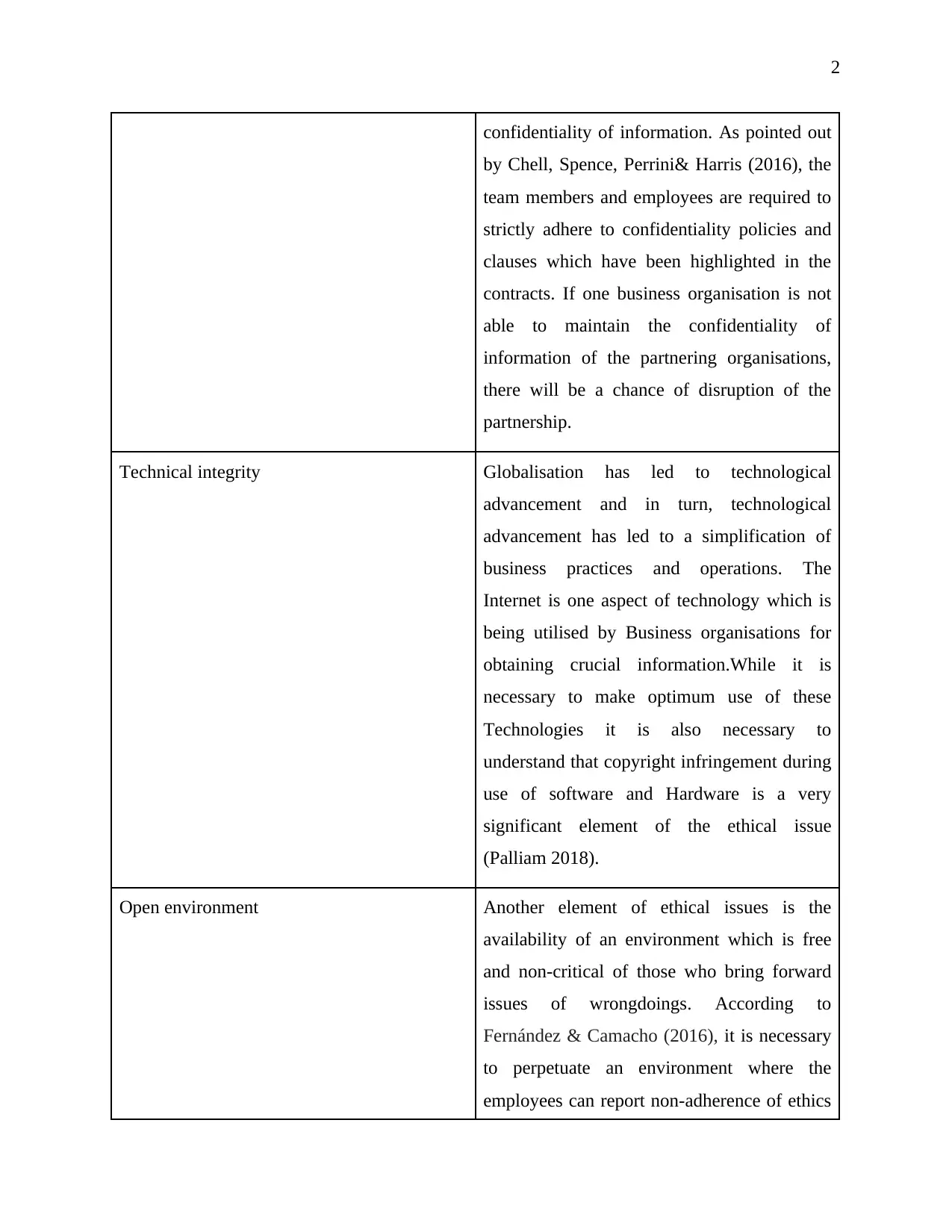
2
confidentiality of information. As pointed out
by Chell, Spence, Perrini& Harris (2016), the
team members and employees are required to
strictly adhere to confidentiality policies and
clauses which have been highlighted in the
contracts. If one business organisation is not
able to maintain the confidentiality of
information of the partnering organisations,
there will be a chance of disruption of the
partnership.
Technical integrity Globalisation has led to technological
advancement and in turn, technological
advancement has led to a simplification of
business practices and operations. The
Internet is one aspect of technology which is
being utilised by Business organisations for
obtaining crucial information.While it is
necessary to make optimum use of these
Technologies it is also necessary to
understand that copyright infringement during
use of software and Hardware is a very
significant element of the ethical issue
(Palliam 2018).
Open environment Another element of ethical issues is the
availability of an environment which is free
and non-critical of those who bring forward
issues of wrongdoings. According to
Fernández & Camacho (2016), it is necessary
to perpetuate an environment where the
employees can report non-adherence of ethics
confidentiality of information. As pointed out
by Chell, Spence, Perrini& Harris (2016), the
team members and employees are required to
strictly adhere to confidentiality policies and
clauses which have been highlighted in the
contracts. If one business organisation is not
able to maintain the confidentiality of
information of the partnering organisations,
there will be a chance of disruption of the
partnership.
Technical integrity Globalisation has led to technological
advancement and in turn, technological
advancement has led to a simplification of
business practices and operations. The
Internet is one aspect of technology which is
being utilised by Business organisations for
obtaining crucial information.While it is
necessary to make optimum use of these
Technologies it is also necessary to
understand that copyright infringement during
use of software and Hardware is a very
significant element of the ethical issue
(Palliam 2018).
Open environment Another element of ethical issues is the
availability of an environment which is free
and non-critical of those who bring forward
issues of wrongdoings. According to
Fernández & Camacho (2016), it is necessary
to perpetuate an environment where the
employees can report non-adherence of ethics
⊘ This is a preview!⊘
Do you want full access?
Subscribe today to unlock all pages.

Trusted by 1+ million students worldwide
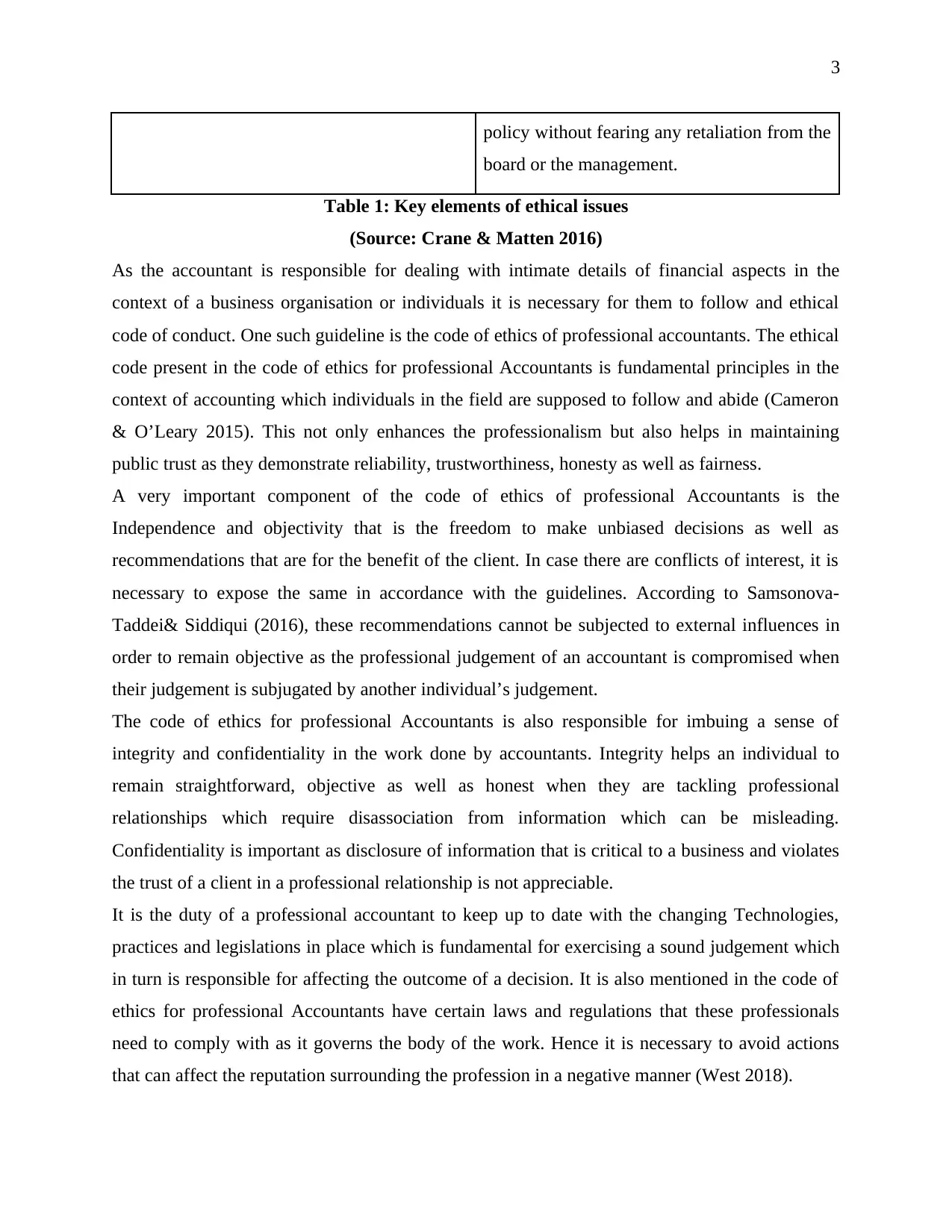
3
policy without fearing any retaliation from the
board or the management.
Table 1: Key elements of ethical issues
(Source: Crane & Matten 2016)
As the accountant is responsible for dealing with intimate details of financial aspects in the
context of a business organisation or individuals it is necessary for them to follow and ethical
code of conduct. One such guideline is the code of ethics of professional accountants. The ethical
code present in the code of ethics for professional Accountants is fundamental principles in the
context of accounting which individuals in the field are supposed to follow and abide (Cameron
& O’Leary 2015). This not only enhances the professionalism but also helps in maintaining
public trust as they demonstrate reliability, trustworthiness, honesty as well as fairness.
A very important component of the code of ethics of professional Accountants is the
Independence and objectivity that is the freedom to make unbiased decisions as well as
recommendations that are for the benefit of the client. In case there are conflicts of interest, it is
necessary to expose the same in accordance with the guidelines. According to Samsonova-
Taddei& Siddiqui (2016), these recommendations cannot be subjected to external influences in
order to remain objective as the professional judgement of an accountant is compromised when
their judgement is subjugated by another individual’s judgement.
The code of ethics for professional Accountants is also responsible for imbuing a sense of
integrity and confidentiality in the work done by accountants. Integrity helps an individual to
remain straightforward, objective as well as honest when they are tackling professional
relationships which require disassociation from information which can be misleading.
Confidentiality is important as disclosure of information that is critical to a business and violates
the trust of a client in a professional relationship is not appreciable.
It is the duty of a professional accountant to keep up to date with the changing Technologies,
practices and legislations in place which is fundamental for exercising a sound judgement which
in turn is responsible for affecting the outcome of a decision. It is also mentioned in the code of
ethics for professional Accountants have certain laws and regulations that these professionals
need to comply with as it governs the body of the work. Hence it is necessary to avoid actions
that can affect the reputation surrounding the profession in a negative manner (West 2018).
policy without fearing any retaliation from the
board or the management.
Table 1: Key elements of ethical issues
(Source: Crane & Matten 2016)
As the accountant is responsible for dealing with intimate details of financial aspects in the
context of a business organisation or individuals it is necessary for them to follow and ethical
code of conduct. One such guideline is the code of ethics of professional accountants. The ethical
code present in the code of ethics for professional Accountants is fundamental principles in the
context of accounting which individuals in the field are supposed to follow and abide (Cameron
& O’Leary 2015). This not only enhances the professionalism but also helps in maintaining
public trust as they demonstrate reliability, trustworthiness, honesty as well as fairness.
A very important component of the code of ethics of professional Accountants is the
Independence and objectivity that is the freedom to make unbiased decisions as well as
recommendations that are for the benefit of the client. In case there are conflicts of interest, it is
necessary to expose the same in accordance with the guidelines. According to Samsonova-
Taddei& Siddiqui (2016), these recommendations cannot be subjected to external influences in
order to remain objective as the professional judgement of an accountant is compromised when
their judgement is subjugated by another individual’s judgement.
The code of ethics for professional Accountants is also responsible for imbuing a sense of
integrity and confidentiality in the work done by accountants. Integrity helps an individual to
remain straightforward, objective as well as honest when they are tackling professional
relationships which require disassociation from information which can be misleading.
Confidentiality is important as disclosure of information that is critical to a business and violates
the trust of a client in a professional relationship is not appreciable.
It is the duty of a professional accountant to keep up to date with the changing Technologies,
practices and legislations in place which is fundamental for exercising a sound judgement which
in turn is responsible for affecting the outcome of a decision. It is also mentioned in the code of
ethics for professional Accountants have certain laws and regulations that these professionals
need to comply with as it governs the body of the work. Hence it is necessary to avoid actions
that can affect the reputation surrounding the profession in a negative manner (West 2018).
Paraphrase This Document
Need a fresh take? Get an instant paraphrase of this document with our AI Paraphraser
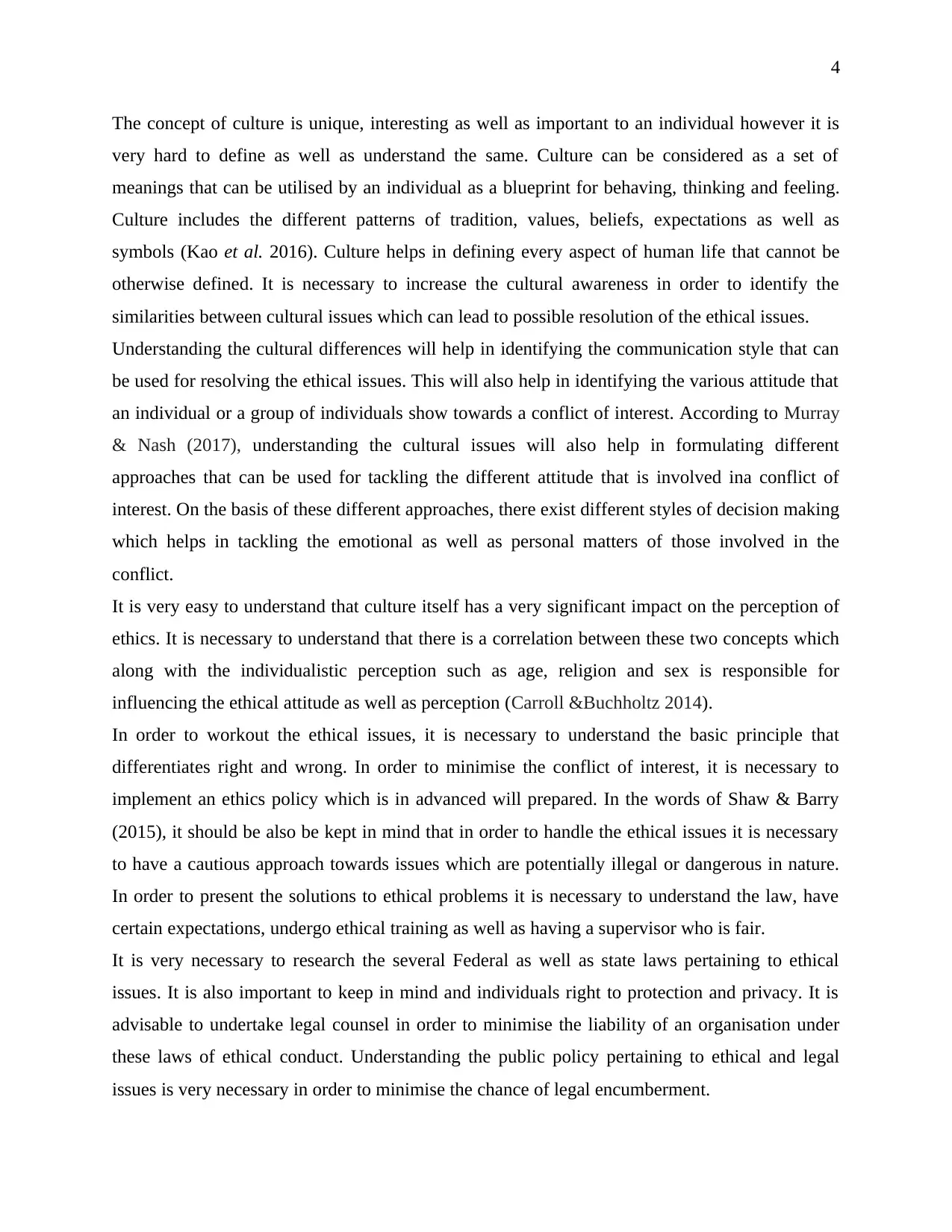
4
The concept of culture is unique, interesting as well as important to an individual however it is
very hard to define as well as understand the same. Culture can be considered as a set of
meanings that can be utilised by an individual as a blueprint for behaving, thinking and feeling.
Culture includes the different patterns of tradition, values, beliefs, expectations as well as
symbols (Kao et al. 2016). Culture helps in defining every aspect of human life that cannot be
otherwise defined. It is necessary to increase the cultural awareness in order to identify the
similarities between cultural issues which can lead to possible resolution of the ethical issues.
Understanding the cultural differences will help in identifying the communication style that can
be used for resolving the ethical issues. This will also help in identifying the various attitude that
an individual or a group of individuals show towards a conflict of interest. According to Murray
& Nash (2017), understanding the cultural issues will also help in formulating different
approaches that can be used for tackling the different attitude that is involved ina conflict of
interest. On the basis of these different approaches, there exist different styles of decision making
which helps in tackling the emotional as well as personal matters of those involved in the
conflict.
It is very easy to understand that culture itself has a very significant impact on the perception of
ethics. It is necessary to understand that there is a correlation between these two concepts which
along with the individualistic perception such as age, religion and sex is responsible for
influencing the ethical attitude as well as perception (Carroll &Buchholtz 2014).
In order to workout the ethical issues, it is necessary to understand the basic principle that
differentiates right and wrong. In order to minimise the conflict of interest, it is necessary to
implement an ethics policy which is in advanced will prepared. In the words of Shaw & Barry
(2015), it should be also be kept in mind that in order to handle the ethical issues it is necessary
to have a cautious approach towards issues which are potentially illegal or dangerous in nature.
In order to present the solutions to ethical problems it is necessary to understand the law, have
certain expectations, undergo ethical training as well as having a supervisor who is fair.
It is very necessary to research the several Federal as well as state laws pertaining to ethical
issues. It is also important to keep in mind and individuals right to protection and privacy. It is
advisable to undertake legal counsel in order to minimise the liability of an organisation under
these laws of ethical conduct. Understanding the public policy pertaining to ethical and legal
issues is very necessary in order to minimise the chance of legal encumberment.
The concept of culture is unique, interesting as well as important to an individual however it is
very hard to define as well as understand the same. Culture can be considered as a set of
meanings that can be utilised by an individual as a blueprint for behaving, thinking and feeling.
Culture includes the different patterns of tradition, values, beliefs, expectations as well as
symbols (Kao et al. 2016). Culture helps in defining every aspect of human life that cannot be
otherwise defined. It is necessary to increase the cultural awareness in order to identify the
similarities between cultural issues which can lead to possible resolution of the ethical issues.
Understanding the cultural differences will help in identifying the communication style that can
be used for resolving the ethical issues. This will also help in identifying the various attitude that
an individual or a group of individuals show towards a conflict of interest. According to Murray
& Nash (2017), understanding the cultural issues will also help in formulating different
approaches that can be used for tackling the different attitude that is involved ina conflict of
interest. On the basis of these different approaches, there exist different styles of decision making
which helps in tackling the emotional as well as personal matters of those involved in the
conflict.
It is very easy to understand that culture itself has a very significant impact on the perception of
ethics. It is necessary to understand that there is a correlation between these two concepts which
along with the individualistic perception such as age, religion and sex is responsible for
influencing the ethical attitude as well as perception (Carroll &Buchholtz 2014).
In order to workout the ethical issues, it is necessary to understand the basic principle that
differentiates right and wrong. In order to minimise the conflict of interest, it is necessary to
implement an ethics policy which is in advanced will prepared. In the words of Shaw & Barry
(2015), it should be also be kept in mind that in order to handle the ethical issues it is necessary
to have a cautious approach towards issues which are potentially illegal or dangerous in nature.
In order to present the solutions to ethical problems it is necessary to understand the law, have
certain expectations, undergo ethical training as well as having a supervisor who is fair.
It is very necessary to research the several Federal as well as state laws pertaining to ethical
issues. It is also important to keep in mind and individuals right to protection and privacy. It is
advisable to undertake legal counsel in order to minimise the liability of an organisation under
these laws of ethical conduct. Understanding the public policy pertaining to ethical and legal
issues is very necessary in order to minimise the chance of legal encumberment.
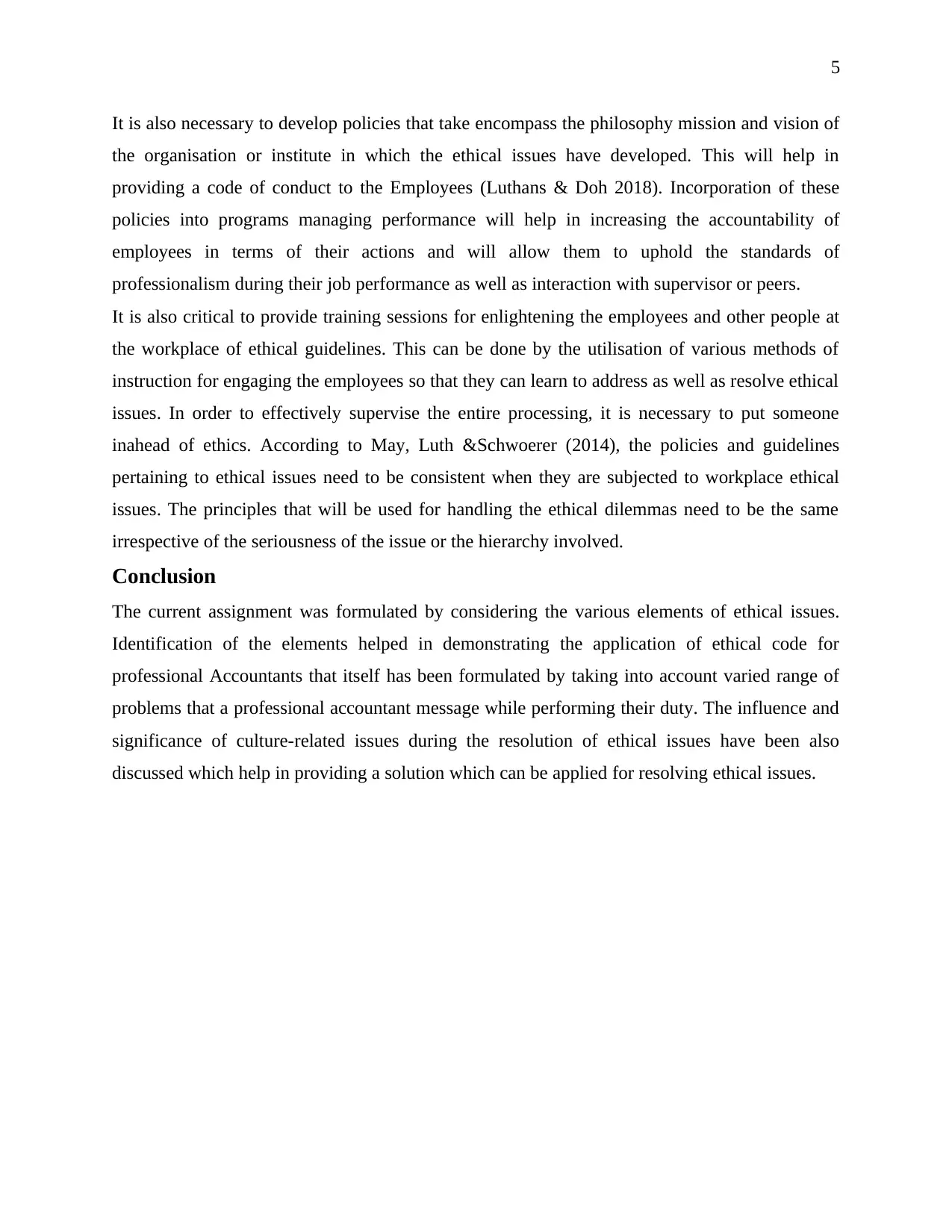
5
It is also necessary to develop policies that take encompass the philosophy mission and vision of
the organisation or institute in which the ethical issues have developed. This will help in
providing a code of conduct to the Employees (Luthans & Doh 2018). Incorporation of these
policies into programs managing performance will help in increasing the accountability of
employees in terms of their actions and will allow them to uphold the standards of
professionalism during their job performance as well as interaction with supervisor or peers.
It is also critical to provide training sessions for enlightening the employees and other people at
the workplace of ethical guidelines. This can be done by the utilisation of various methods of
instruction for engaging the employees so that they can learn to address as well as resolve ethical
issues. In order to effectively supervise the entire processing, it is necessary to put someone
inahead of ethics. According to May, Luth &Schwoerer (2014), the policies and guidelines
pertaining to ethical issues need to be consistent when they are subjected to workplace ethical
issues. The principles that will be used for handling the ethical dilemmas need to be the same
irrespective of the seriousness of the issue or the hierarchy involved.
Conclusion
The current assignment was formulated by considering the various elements of ethical issues.
Identification of the elements helped in demonstrating the application of ethical code for
professional Accountants that itself has been formulated by taking into account varied range of
problems that a professional accountant message while performing their duty. The influence and
significance of culture-related issues during the resolution of ethical issues have been also
discussed which help in providing a solution which can be applied for resolving ethical issues.
It is also necessary to develop policies that take encompass the philosophy mission and vision of
the organisation or institute in which the ethical issues have developed. This will help in
providing a code of conduct to the Employees (Luthans & Doh 2018). Incorporation of these
policies into programs managing performance will help in increasing the accountability of
employees in terms of their actions and will allow them to uphold the standards of
professionalism during their job performance as well as interaction with supervisor or peers.
It is also critical to provide training sessions for enlightening the employees and other people at
the workplace of ethical guidelines. This can be done by the utilisation of various methods of
instruction for engaging the employees so that they can learn to address as well as resolve ethical
issues. In order to effectively supervise the entire processing, it is necessary to put someone
inahead of ethics. According to May, Luth &Schwoerer (2014), the policies and guidelines
pertaining to ethical issues need to be consistent when they are subjected to workplace ethical
issues. The principles that will be used for handling the ethical dilemmas need to be the same
irrespective of the seriousness of the issue or the hierarchy involved.
Conclusion
The current assignment was formulated by considering the various elements of ethical issues.
Identification of the elements helped in demonstrating the application of ethical code for
professional Accountants that itself has been formulated by taking into account varied range of
problems that a professional accountant message while performing their duty. The influence and
significance of culture-related issues during the resolution of ethical issues have been also
discussed which help in providing a solution which can be applied for resolving ethical issues.
⊘ This is a preview!⊘
Do you want full access?
Subscribe today to unlock all pages.

Trusted by 1+ million students worldwide
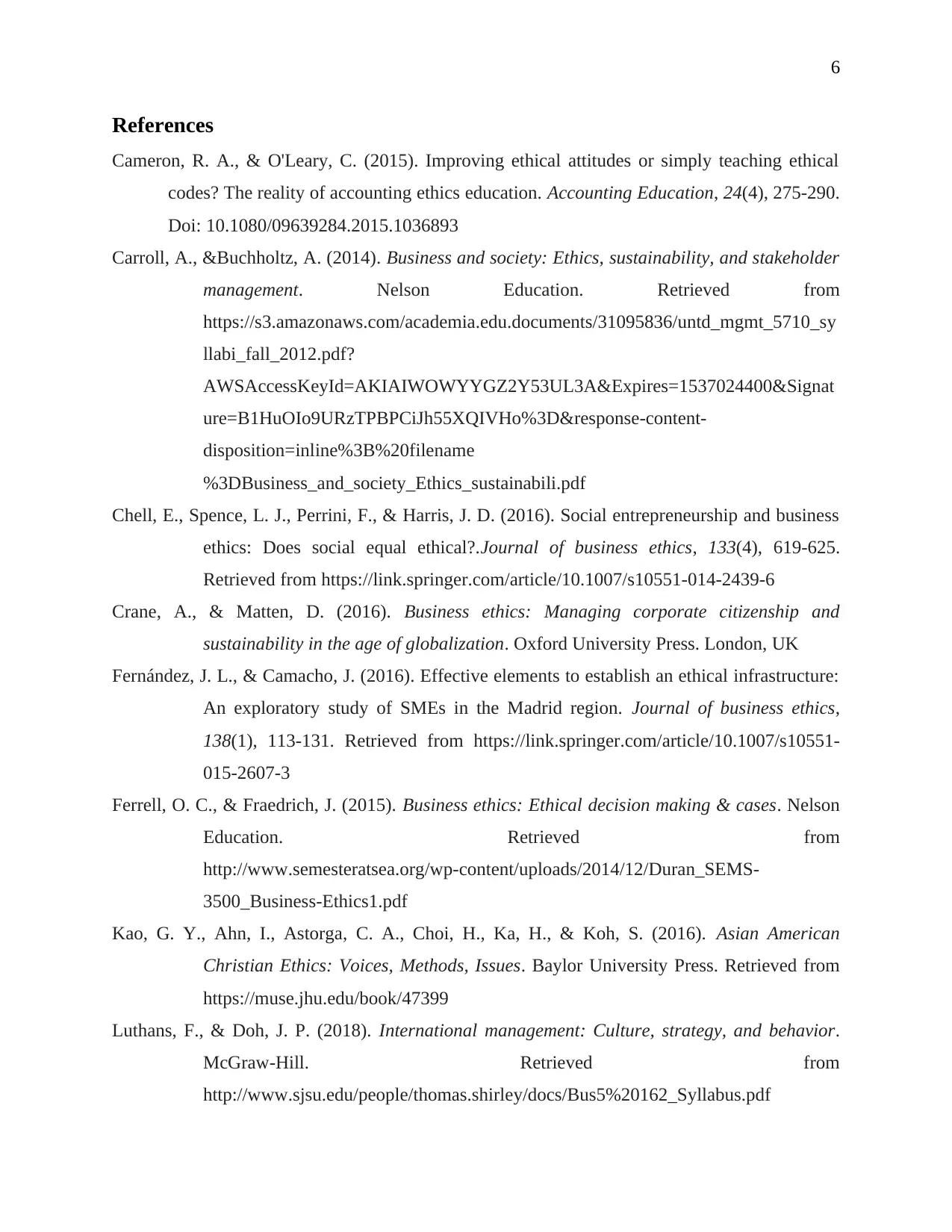
6
References
Cameron, R. A., & O'Leary, C. (2015). Improving ethical attitudes or simply teaching ethical
codes? The reality of accounting ethics education. Accounting Education, 24(4), 275-290.
Doi: 10.1080/09639284.2015.1036893
Carroll, A., &Buchholtz, A. (2014). Business and society: Ethics, sustainability, and stakeholder
management. Nelson Education. Retrieved from
https://s3.amazonaws.com/academia.edu.documents/31095836/untd_mgmt_5710_sy
llabi_fall_2012.pdf?
AWSAccessKeyId=AKIAIWOWYYGZ2Y53UL3A&Expires=1537024400&Signat
ure=B1HuOIo9URzTPBPCiJh55XQIVHo%3D&response-content-
disposition=inline%3B%20filename
%3DBusiness_and_society_Ethics_sustainabili.pdf
Chell, E., Spence, L. J., Perrini, F., & Harris, J. D. (2016). Social entrepreneurship and business
ethics: Does social equal ethical?.Journal of business ethics, 133(4), 619-625.
Retrieved from https://link.springer.com/article/10.1007/s10551-014-2439-6
Crane, A., & Matten, D. (2016). Business ethics: Managing corporate citizenship and
sustainability in the age of globalization. Oxford University Press. London, UK
Fernández, J. L., & Camacho, J. (2016). Effective elements to establish an ethical infrastructure:
An exploratory study of SMEs in the Madrid region. Journal of business ethics,
138(1), 113-131. Retrieved from https://link.springer.com/article/10.1007/s10551-
015-2607-3
Ferrell, O. C., & Fraedrich, J. (2015). Business ethics: Ethical decision making & cases. Nelson
Education. Retrieved from
http://www.semesteratsea.org/wp-content/uploads/2014/12/Duran_SEMS-
3500_Business-Ethics1.pdf
Kao, G. Y., Ahn, I., Astorga, C. A., Choi, H., Ka, H., & Koh, S. (2016). Asian American
Christian Ethics: Voices, Methods, Issues. Baylor University Press. Retrieved from
https://muse.jhu.edu/book/47399
Luthans, F., & Doh, J. P. (2018). International management: Culture, strategy, and behavior.
McGraw-Hill. Retrieved from
http://www.sjsu.edu/people/thomas.shirley/docs/Bus5%20162_Syllabus.pdf
References
Cameron, R. A., & O'Leary, C. (2015). Improving ethical attitudes or simply teaching ethical
codes? The reality of accounting ethics education. Accounting Education, 24(4), 275-290.
Doi: 10.1080/09639284.2015.1036893
Carroll, A., &Buchholtz, A. (2014). Business and society: Ethics, sustainability, and stakeholder
management. Nelson Education. Retrieved from
https://s3.amazonaws.com/academia.edu.documents/31095836/untd_mgmt_5710_sy
llabi_fall_2012.pdf?
AWSAccessKeyId=AKIAIWOWYYGZ2Y53UL3A&Expires=1537024400&Signat
ure=B1HuOIo9URzTPBPCiJh55XQIVHo%3D&response-content-
disposition=inline%3B%20filename
%3DBusiness_and_society_Ethics_sustainabili.pdf
Chell, E., Spence, L. J., Perrini, F., & Harris, J. D. (2016). Social entrepreneurship and business
ethics: Does social equal ethical?.Journal of business ethics, 133(4), 619-625.
Retrieved from https://link.springer.com/article/10.1007/s10551-014-2439-6
Crane, A., & Matten, D. (2016). Business ethics: Managing corporate citizenship and
sustainability in the age of globalization. Oxford University Press. London, UK
Fernández, J. L., & Camacho, J. (2016). Effective elements to establish an ethical infrastructure:
An exploratory study of SMEs in the Madrid region. Journal of business ethics,
138(1), 113-131. Retrieved from https://link.springer.com/article/10.1007/s10551-
015-2607-3
Ferrell, O. C., & Fraedrich, J. (2015). Business ethics: Ethical decision making & cases. Nelson
Education. Retrieved from
http://www.semesteratsea.org/wp-content/uploads/2014/12/Duran_SEMS-
3500_Business-Ethics1.pdf
Kao, G. Y., Ahn, I., Astorga, C. A., Choi, H., Ka, H., & Koh, S. (2016). Asian American
Christian Ethics: Voices, Methods, Issues. Baylor University Press. Retrieved from
https://muse.jhu.edu/book/47399
Luthans, F., & Doh, J. P. (2018). International management: Culture, strategy, and behavior.
McGraw-Hill. Retrieved from
http://www.sjsu.edu/people/thomas.shirley/docs/Bus5%20162_Syllabus.pdf
Paraphrase This Document
Need a fresh take? Get an instant paraphrase of this document with our AI Paraphraser
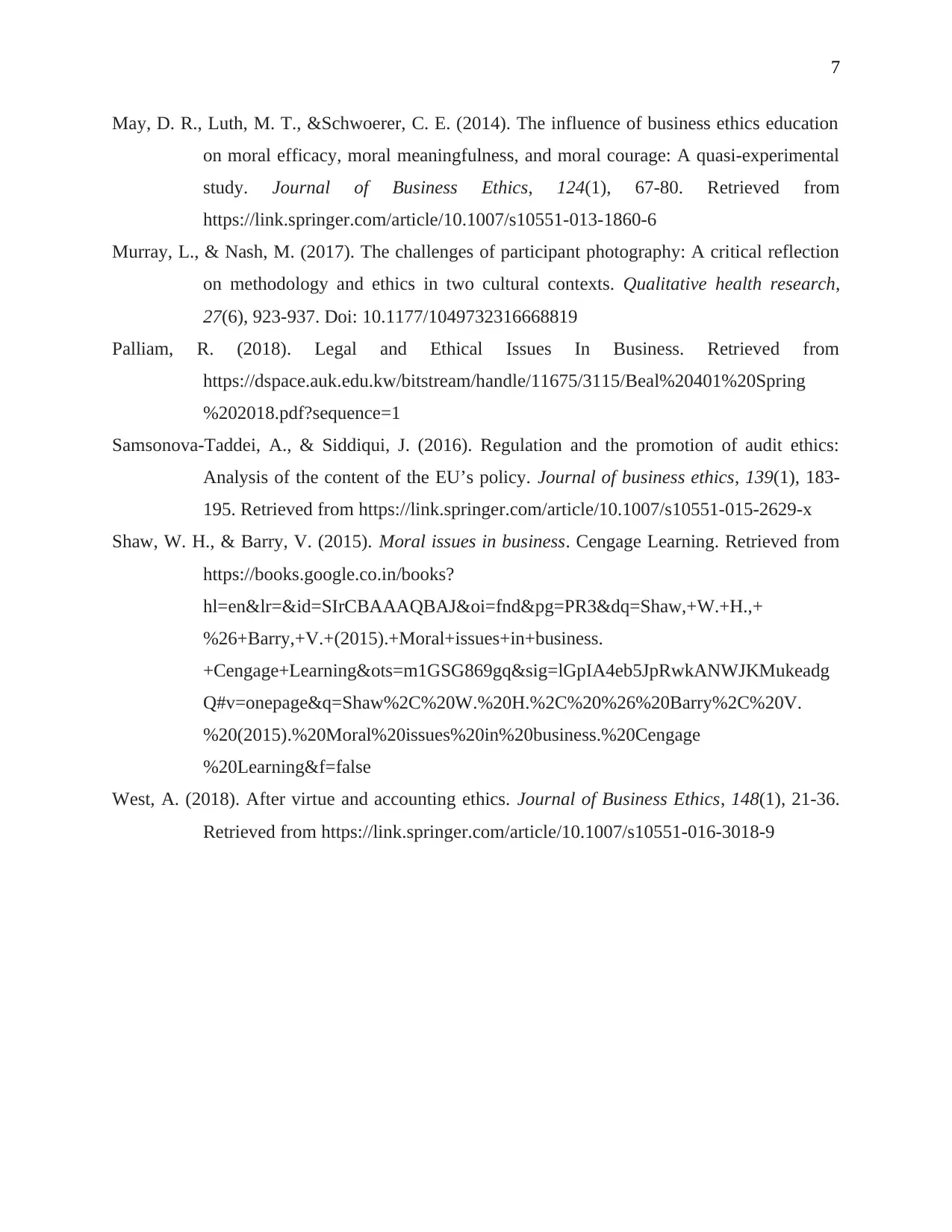
7
May, D. R., Luth, M. T., &Schwoerer, C. E. (2014). The influence of business ethics education
on moral efficacy, moral meaningfulness, and moral courage: A quasi-experimental
study. Journal of Business Ethics, 124(1), 67-80. Retrieved from
https://link.springer.com/article/10.1007/s10551-013-1860-6
Murray, L., & Nash, M. (2017). The challenges of participant photography: A critical reflection
on methodology and ethics in two cultural contexts. Qualitative health research,
27(6), 923-937. Doi: 10.1177/1049732316668819
Palliam, R. (2018). Legal and Ethical Issues In Business. Retrieved from
https://dspace.auk.edu.kw/bitstream/handle/11675/3115/Beal%20401%20Spring
%202018.pdf?sequence=1
Samsonova-Taddei, A., & Siddiqui, J. (2016). Regulation and the promotion of audit ethics:
Analysis of the content of the EU’s policy. Journal of business ethics, 139(1), 183-
195. Retrieved from https://link.springer.com/article/10.1007/s10551-015-2629-x
Shaw, W. H., & Barry, V. (2015). Moral issues in business. Cengage Learning. Retrieved from
https://books.google.co.in/books?
hl=en&lr=&id=SIrCBAAAQBAJ&oi=fnd&pg=PR3&dq=Shaw,+W.+H.,+
%26+Barry,+V.+(2015).+Moral+issues+in+business.
+Cengage+Learning&ots=m1GSG869gq&sig=lGpIA4eb5JpRwkANWJKMukeadg
Q#v=onepage&q=Shaw%2C%20W.%20H.%2C%20%26%20Barry%2C%20V.
%20(2015).%20Moral%20issues%20in%20business.%20Cengage
%20Learning&f=false
West, A. (2018). After virtue and accounting ethics. Journal of Business Ethics, 148(1), 21-36.
Retrieved from https://link.springer.com/article/10.1007/s10551-016-3018-9
May, D. R., Luth, M. T., &Schwoerer, C. E. (2014). The influence of business ethics education
on moral efficacy, moral meaningfulness, and moral courage: A quasi-experimental
study. Journal of Business Ethics, 124(1), 67-80. Retrieved from
https://link.springer.com/article/10.1007/s10551-013-1860-6
Murray, L., & Nash, M. (2017). The challenges of participant photography: A critical reflection
on methodology and ethics in two cultural contexts. Qualitative health research,
27(6), 923-937. Doi: 10.1177/1049732316668819
Palliam, R. (2018). Legal and Ethical Issues In Business. Retrieved from
https://dspace.auk.edu.kw/bitstream/handle/11675/3115/Beal%20401%20Spring
%202018.pdf?sequence=1
Samsonova-Taddei, A., & Siddiqui, J. (2016). Regulation and the promotion of audit ethics:
Analysis of the content of the EU’s policy. Journal of business ethics, 139(1), 183-
195. Retrieved from https://link.springer.com/article/10.1007/s10551-015-2629-x
Shaw, W. H., & Barry, V. (2015). Moral issues in business. Cengage Learning. Retrieved from
https://books.google.co.in/books?
hl=en&lr=&id=SIrCBAAAQBAJ&oi=fnd&pg=PR3&dq=Shaw,+W.+H.,+
%26+Barry,+V.+(2015).+Moral+issues+in+business.
+Cengage+Learning&ots=m1GSG869gq&sig=lGpIA4eb5JpRwkANWJKMukeadg
Q#v=onepage&q=Shaw%2C%20W.%20H.%2C%20%26%20Barry%2C%20V.
%20(2015).%20Moral%20issues%20in%20business.%20Cengage
%20Learning&f=false
West, A. (2018). After virtue and accounting ethics. Journal of Business Ethics, 148(1), 21-36.
Retrieved from https://link.springer.com/article/10.1007/s10551-016-3018-9
1 out of 8
Related Documents
Your All-in-One AI-Powered Toolkit for Academic Success.
+13062052269
info@desklib.com
Available 24*7 on WhatsApp / Email
![[object Object]](/_next/static/media/star-bottom.7253800d.svg)
Unlock your academic potential
Copyright © 2020–2026 A2Z Services. All Rights Reserved. Developed and managed by ZUCOL.





